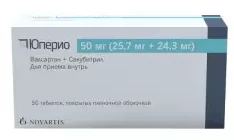Description
Biprol Pharmacodynamics
A selective beta1-adrenoblocker, without sympathomimetic activity of its own, has no membrane-stabilizing effect. It has antihypertensive, antiarrhythmic and antianginal effects. By blocking low doses of beta1-adrenoceptors in the heart, it reduces catecholamine-stimulated formation of cyclic adenosine monophosphate from adenosine triphosphate, decreases intracellular calcium ion current, has negative chrono-, dromo-, batmo- and inotropic effects, reduces atrioventricular (AV) conduction and excitability. If the therapeutic dose is exceeded, it has a beta2-adrenoblocking effect. Total peripheral vascular resistance increases (as a result of reciprocal increase of activity of alpha-adrenoreceptors and elimination of stimulation of beta2-adrenoreceptors) at the beginning of drug administration (during the first 24 hours), which returns to baseline in 1-3 days, and decreases with prolonged use. Antihypertensive effect is associated with decreased minute blood volume, sympathetic stimulation of peripheral vessels, decreased activity of renin-angiotensin-aldosterone system (it is important for patients with initial renin hypersecretion), restoration of aortic arch baroreceptors sensitivity (their activity in response to blood pressure decrease is not increased) and the effect on the central nervous system. In arterial hypertension, the effect develops in 2-5 days, stable effect – in 1-2 months. Antianginal action is caused by reduction of myocardial oxygen demand as a result of decreased heart rate and myocardial contractility, prolongation of diastole, improvement of myocardial perfusion. By increasing left ventricular end-diastolic pressure and increasing ventricular muscle fiber stretch can increase myocardial oxygen demand, especially in patients with chronic heart failure (CHF). Antiarrhythmic action is due to the elimination of arrhythmogenic factors (tachycardia, increased sympathetic nervous system activity, increased cyclic adenosine monophosphate, arterial hypertension), reduction of spontaneous excitation rate of sinus and ectopic pacemakers and slowing of AV conduction (mainly in antegrade and, to a lesser extent, in retrograde directions) through the atrioventricular node and along additional pathways. When used in medium therapeutic doses, unlike non-selective beta-adrenoblockers, it has less pronounced effect on the organs containing beta2-adrenoreceptors (pancreas, skeletal muscles, smooth muscle of peripheral arteries, bronchi and uterus) and on carbohydrate metabolism; does not cause delay of sodium ions in the body.
Indications
Arterial hypertension. Coronary heart disease: prevention of stable angina attacks.
Contraindications
Hypersensitivity to bisoprolol, other drug components and other beta-adrenoblockers; shock (including cardiogenic shock); pulmonary edema; acute heart failure or CHF in decompensation, requiring inotropic therapy; AV block II-III degree, without pacemaker; sinoatrial blockade; sinus node weakness syndrome; bradycardia (heart rate less than 60 bpm); Prinzmetal angina; cardiomegaly (without signs of heart failure); severe arterial hypotension (systolic BP less than 100 mm Hg. ), especially in myocardial infarction; history of severe bronchial asthma and chronic obstructive pulmonary disease (COPD); concomitant use of floktafenine, sultopride, monoamine oxidase inhibitors (MAO), except MAO type B; concomitant intravenous administration of verapamil or diltiazem; severe peripheral circulatory disorders, Raynaud’s syndrome; pheochromocytoma (without concomitant use of alpha-adrenoblockers); metabolic acidosis; age under 18 years (effectiveness and safety not established). Lactase deficiency, lactose intolerance, lactose/isomaltose malabsorption syndrome (the drug contains lactose).
Pregnancy and lactation
Bisoprolol has no direct cytotoxic, mutagenic and teratogenic effects, but has pharmacological effects that may have harmful effects on pregnancy and/or the fetus, or the newborn. Typically, beta-adrenoblockers decrease placental perfusion, which leads to fetal growth retardation, intrauterine fetal death, miscarriage, or preterm birth. The fetus and the newborn child may have pathological reactions such as intrauterine retardation, hypoglycemia, and bradycardia. Biprol should not be used during pregnancy. Use is possible if the benefit to the mother exceeds the risk of side effects in the fetus and/or child. When treatment with Biprol is considered necessary, the blood flow in the placenta and uterus should be monitored, and the growth and development of the fetus should be monitored. In the event of adverse events in relation to pregnancy and/or fetus, alternative therapies should be used. The newborn should be carefully examined after delivery. Symptoms of hypoglycemia and bradycardia usually occur within the first 3 days of life. There are no data on bisoprolol penetration into breast milk, therefore, Biprolol administration is not recommended for women during lactation. If it is necessary to apply the drug during lactation, breastfeeding must be stopped.
Dosage and administration method
- Biprol is taken orally, in the morning, once a day with some fluid, before, during or after breakfast. Tablets should not be chewed or ground into a powder. In all cases, the doctor chooses the regimen and dose for each patient individually, in particular taking into account the heart rate and the patient’s condition. In arterial hypertension and coronary heart disease, the drug is prescribed at 5 mg once a day.
- If necessary, the dose is increased to 10 mg once daily. In treatment of arterial hypertension and angina pectoris, the maximum daily dose is 20 mg once daily. For patients with significant renal impairment (creatinine clearance less than 20 ml/min) or with significant hepatic impairment, the maximum daily dose is 10 mg once daily.
- Increase of the dose in such patients should be carried out with special caution. No dose adjustment is required in elderly patients.

![Bisoprolol (Biprol) 5 mg - [100 tablets]](https://mediscom.com.co/wp-content/uploads/2025/06/Biprol-5mg-100.webp)
![Enap-NL 10 mg + 12.5 mg [60 tablets]](https://mediscom.com.co/wp-content/uploads/2025/06/Enap-NL-10125mg-60.webp)

![Potassium aspartate, magnesium aspartate (Panangin) - [50 tablets]](https://mediscom.com.co/wp-content/uploads/2025/06/Panangin-50.webp)
![Acetylsalicylic acid, magnesium hydroxide (Trombital Forte) 150 mg + 30.39 mg - [100 tablets]](https://mediscom.com.co/wp-content/uploads/2025/06/Trombital-Forte-150mg30.39mg-100.webp)